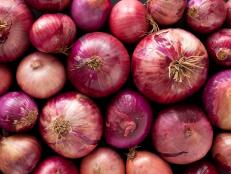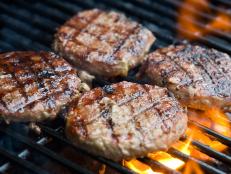Is It Safe to Eat Freezer Burned Food?
Everything you need to know about eating food from the freezer.

Issaurinko/Getty
How often do you find “hidden treasures” in your freezer? You pull the food from the ice box only to find that it's freezer burned. According to the Food Safety and Inspection Service (FSIS), callers to the USDA Meat and Poultry Hotline aren’t sure about the safety of items stored in their own home freezers — including foods that are freezer burned. But don’t toss that freezer burned food just yet! Here is the lowdown on the safety of freezer burned food and how to minimize it from happening.
First, Freezer Burn Is a Quality Issue
According to the FSIS, freezer burn doesn’t make food unsafe, but rather it makes it dry in spots which is a quality issue not food safety issue. These dry areas appear as grayish-brown spots and are caused by air coming into contact with the surface of the food. The FSIS recommends cutting off freezer-burned areas either before or after cooking the food. If a food is heavily freezer-burned, however, you’ll probably want to toss it, as it won’t taste as good since the quality was compromised.
Proper packing helps maintain the food quality and prevent freezer burn. You can freeze meat and poultry in the package you received it in, but if you plan on freezing it for a long period of time, the packaging is permeable to air which can decrease the quality. If you plan on storing food a long period of time (like months), wrap the packages of meat and poultry using aluminum foil (so you have extra protection).
Knowing how to best use your freezer and store food in it can help maintain the best quality of your food. Here are some basic guidelines to follow.
What Can You Freeze?
You can actually freeze almost any food except canned foods or eggs in its shells. Once the food is out of the can (like ham) you can freeze it. That said, just because you can freeze a food, doesn’t mean you’ll like how it tastes after it's defrosted. Some foods undergo texture changes and just don’t taste good after freezing including lettuce, mayo and cream sauces. When freezing meat and poultry, the quality is maintained longer when they’re raw because cooked meat and poultry lose moisture during cooking.
How Cold Should Your Freezer Be?
Well, freezing! As long as you always keep your freezer at 0 degrees F, the food will be safe to eat. However, the longer you store foods in the freezer, the more the quality can suffer. This is because freezing preserves food for longer periods of time, as it prevents the growth of microorganisms that can cause food to spoil or someone to become ill.
Can Freezing Food Kill Bacteria?
It is a common misconception that freezing destroys microorganisms like bacteria, mold, and yeast. Freezing just inactivates these microorganisms and once the food is thawed, they can become active again and multiply under the right conditions to amounts that can get you sick. That is why any thawed food should be handled with care. You should cook it to the correct minimal internal cooking temperature and prevent cross-contamination when handling.
How Soon Should You Freeze Food?
Many folks question the quality of the food after thawing it. The freshness and quality at the time of freezing will affect the condition of your frozen foods. If the food is frozen at its peak quality, then once thawed, the food will taste better than foods that are frozen towards the end of their “use by” date.
Does Freezing Food Destroy Nutrients?
Interestingly, many believe that nutrients are destroyed during freezing and that isn’t the case. The freezing process doesn’t destroy nutrients. According to the FSIS, meat and poultry products have little change in nutrient value when frozen.
What About Refreezing?
Refreezing food is another common question from consumers. If you do thaw food in the refrigerator, then it’s safe to refreeze without cooking (but the quality may be compromised from moisture loss). If you cook foods that were previously frozen (like raw ground beef that are now burgers), you can freeze those cooked foods. Even if you have cooked foods that were thawed in the refrigerator, you can refreeze those unused portions. Leftovers should be frozen within 3 to 4 days. If any food was left outside the refrigerator for longer than 2 hours, it should not be frozen. On a hot day where it’s above 90-degrees Fahrenheit, do not freeze leftovers that have been out for more than 1 hour.
Toby Amidor, MS, RD, CDN, is a registered dietitian and consultant who specializes in food safety and culinary nutrition. She is the author of The Greek Yogurt Kitchen: More Than 130 Delicious, Healthy Recipes for Every Meal of the Day.
*This article was written and/or reviewed by an independent registered dietitian nutritionist.
Related Links:


























